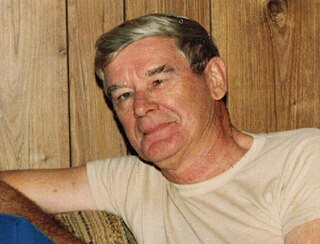Related Research Articles
First Fandom is an informal association of early, active and well-known science fiction fans.

Science fiction fandom or SF fandom is a community or fandom of people interested in science fiction in contact with one another based upon that interest. SF fandom has a life of its own, but not much in the way of formal organization.

A fan convention is an event in which fans of a particular topic gather to participate and hold programs and other events, and to meet experts, famous personalities, and each other. Some also incorporate commercial activity. The term dates back to at least 1942.
Harry Warner Jr. was an American journalist. He spent 40 years working for the Hagerstown, Maryland, Herald-Mail.

Arthur Wilson "Bob" Tucker was an American author who became well known as a writer of mystery, action adventure, and science fiction under the name Wilson Tucker.
Egoboo is a colloquial expression for the pleasure received from public recognition of voluntary work.
Fanspeak is the slang or jargon current in science fiction and fantasy fandom, especially those terms in use among readers and writers of science fiction fanzines.
The 1st World Science Fiction Convention (Worldcon) was held on 2–4 July 1939 in the Caravan Hall in New York City, United States, in conjunction with the New York World's Fair, which was themed as "The World of Tomorrow". It was later retroactively named "NyCon I" by Forrest J Ackerman.
The 2nd World Science Fiction Convention (Worldcon), also known as Chicon I, was held on 1–2 September 1940 at the Hotel Chicagoan in Chicago, Illinois, United States.
The 34th World Science Fiction Convention (Worldcon), also known as MidAmeriCon, was held on 2–6 September 1976 at the Radisson Muehlebach Hotel and nearby Phillips House hotel in Kansas City, Missouri, United States.
SMOF is an acronym which stands for "Secret Master(s) Of Fandom" and is a term used within the science fiction fan community. Its coining is generally attributed to long-time science fiction fan and author Jack L. Chalker.
The DeepSouthCon (DSC) is an annual science fiction convention, which is hosted in different cities in the Southern United States. Site selection is by vote of the membership of a given DSC, for the convention to be held 2 years in the future. DSC is often, but not always, held in conjunction with an existing annual convention so the time of year varies. Many regular attendees of DeepSouthCon are also members of the Southern Fandom Confederation, but there is no direct relationship between the two organizations.
Philcon, also known as the "Philadelphia Science Fiction Conference", is an annual three-day science fiction convention held at the Doubletree by Hilton Hotel in Cherry Hill, New Jersey. The convention is run by the Philadelphia Science Fiction Society (PSFS).

The 9th World Science Fiction Convention (Worldcon), also known as Nolacon I, was held 1–3 September 1951 at the St. Charles Hotel in New Orleans, Louisiana, United States.

The 14th World Science Fiction Convention (Worldcon), also known as NyCon II or NEWYORCON, was held on 31 August–3 September 1956 at the Biltmore Hotel in New York City, United States.
The 20th World Science Fiction Convention (Worldcon), also known unofficially as Chicon III, was held on 31 August–3 September 1962 at the Pick-Congress Hotel in Chicago, Illinois, United States.
The 54th World Science Fiction Convention (Worldcon), also known as L.A.con III, was held on 29 August–2 September 1996 at the Hilton Anaheim, Anaheim Marriott, and the Anaheim Convention Center in Anaheim, California, United States.

John Bristol Speer was an attorney, practicing law for over 60 years; a judge; and a member of the Washington House of Representatives.
Peggy Rae Sapienza, was a science fiction fan, con-runner, and promoter of science fiction fandom. She made memorable contributions to Noreascon III in Boston, the 1989 Worldcon, partnering with Fred Isaacs in conceptualizing the ConCourse, a new feature for Worldcons. A Vice Chair of the 1993 Worldcon, ConFrancisco, she served briefly as Acting Chair after the Chairman died, until a new chairman was appointed. In 1998 she chaired BucConeer, the 56th Worldcon in Baltimore. She served as North American agent for the first Worldcon to be held in Japan, Nippon 2007; in 2010 co-chaired, and 2011 and 2012 chaired the SFWA Nebula Awards Weekends; and was Fan Guest of Honor at Chicon 7, the 70th Worldcon, held in 2012. She co-chaired the 2014 World Fantasy Convention just months before she died due to complications from heart surgery.
Myrtle Rebecca Smith Gray Nolan, known to science fiction history as Morojo or sometimes Myrtle R Douglas, was a science fiction fan, fanzine publisher, and cosplay pioneer from Los Angeles.
References
- ↑ Coppa, Francesca (2006). "A Brief History of Media Fandom". In Hellekson, Karen; Busse, Kristina (eds.). Fan Fiction and Fan Communities in the Age of the Internet. Jefferson, North Carolina: McFarland & Company. pp. 41–59. ISBN 978-0-7864-2640-9.
- ↑ Tucker, Bob (1955). The Neo-Fan Guide. Archived from the original on 14 June 2006. Retrieved 2006-06-22.
- ↑ Speer, Jack (1959). Dick Eney (ed.). Fancyclopedia II. Archived from the original on 2001-10-06. Retrieved 2006-06-22.
- ↑ Franson, Donald (1962). A Key to the Terminology of Science-Fiction Fandom . Retrieved 2006-06-22.
- ↑ Southard, Bruce (1982). "The Language of Science-Fiction Fan Magazines". American Speech. Duke University Press. 57 (1): 19–31. doi:10.2307/455177. JSTOR 455177.
- ↑ Mike Glyer. "Ackerman's Hugo." File 770 February 10, 2009